EXECUTIVE SUMMARY
The Center for Research and Security Studies (CRSS) held the 2nd Pak-Afghan Religious Scholars Conference as part of Beyond Boundaries V, track 1.5/II initiative, on September 19 and 20, 2022 in Islamabad. The agenda focused on a critical analysis of one-year Taliban rule in Afghanistan, the state of governance, security, human rights, girls’ education, and the inclusion of all ethnic and religious groups in governmental and societal spheres. The conference was attended by a diverse group of religious scholars hailing from different provinces of Pakistan and Afghanistan representing different schools of thought and sects. The list of participants is attached as an annex to this report.
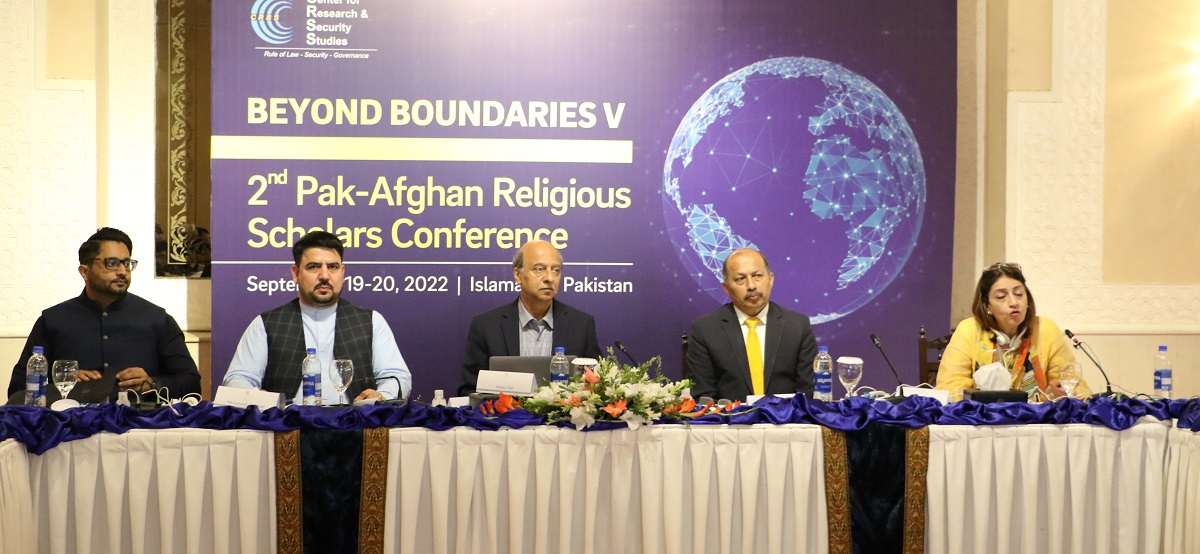
As a follow-up to the 1st Pak-Afghan Religious Conference, updates were shared by the participants on the status of the preliminary document of the Joint Declaration (Fatwa) issued by Pakistani religious scholars in the favour of girls’ education in Afghanistan under an Islamic system of governance. Mufti Noman Naeem and Mr. Hussain Ahmed of Jamiah Binoria stated that the initial step for the Joint Declaration had already taken place with the relevant authorities, but it will take time to build consensus among all the religious stakeholders to issue a public statement as they are also waiting for feedback on some of the questions from the Islamic Emirates of Afghanistan.
Spread over four thematic sessions, the two-day conference centered around a meticulous review of developments that occurred since August 15, 2021; the Taliban’s treatment of women and views on girls’ education; the inclusion of minor and major ethnic and religious groups in the current government; and the state of peace and security – with a keen focus on repercussions of Al Zawahiri’s killing, its impact on the regional security, and the potency of the extremist groups such as Al Qaeda, ISKP (Islamic State of Khurasan Province), TTP (Tehrik-e-Taliban Pakistan), etc., and how it all affects the global visage and clout of the Taliban.
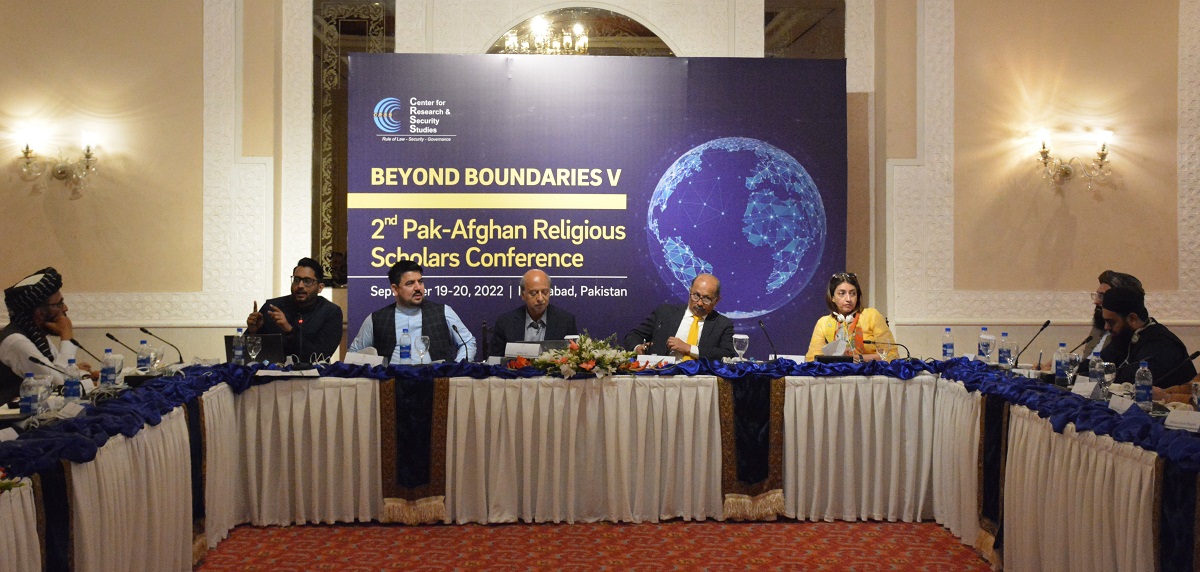
The first session focused on “one year of Taliban rule in Afghanistan”. Dr. Huma Baqai, academician and Pak-Afghan political analyst, gave a thorough and critical overview of the state of governance, human rights, economy, and peace and security under the de facto Taliban government. Former Pakistan’s Ambassador to Afghanistan, Ambassador Mansoor Khan also shared his experience during this session and suggested that the although the Taliban have restored peace in Afghanistan, still they need to come up with a concrete strategy to overcome issues of governance. The second session was on girls’ education and women’s rights. All participants agreed that the Taliban’s prolonged closure of girls’ schools was undue and called for the immediate reopening of the institutes. The third session focused on the inclusion of all ethnic groups in the governance. Participants showed consensus that the Taliban have been negligent and inattentive towards the needs of their people and have not fulfilled the predicates of the Doha Agreement, and that they must live up to the promises they had made when they assumed power. The promises included but were not limited to amnesty, welfare, opportunities, and education for all. They had also assured the international community that they would not let radical elements operate on Afghan soil against other countries, but the presence of terrorist groups has demonstrated that the Taliban either have a feeble will or capacity to tackle terrorism.
Overall, major emphasis was made on normalizing girls’ education, the Taliban’s due compliance to the Doha agreement, continuous engagement of the international community with the Taliban, and potent measures by the de facto government to tackle terrorism to secure stability and peace in the region and earn a favorable stature among the international community.
POLICY RECOMMENDATIONS
The last session was dedicated to formulating policy recommendations based on the two-day discussion and agenda themes. Participants of the conference agreed upon the following recommendations.
GIRLS’ EDUCATION AND WOMEN’S RIGHTS:
- Girls’ education isn’t a demand of the public only, but it is also crucial to the future of Afghanistan. The Taliban should deal with the issue as a priority as Afghan girls can not afford to lose more academic years.
- Religious scholars from both sides should convene a meeting and demand for normalizing girls’ education under an Islamic system of governance
- There should be exposure visits for capacity building of Afghan female teachers and school administrators to Pakistan as Pakistani religious institutes have a very sophisticated system of education for girls and women as per Islamic Shariah
- Instead of leaving Afghanistan, women, and girls on their own should start the practice of home-schooling or virtual learning to avoid losing academic years
- The Afghan community and the world should solely stick to one demand from the Taliban as of now: girls’ education
INCLUSION OF DIFFERENT ETHNICITIES/MINORITIES IN GOVERNANCE
- Religious and ethnic minorities should be protected, ensured mobility, and given equal key portfolios in the current cabinet
- The Taliban should devise a legislative setup that ensures the inclusion of all ethnic groups
- Afghan people should be given the freedom of religious expression, and that can be ensured only if the Taliban demonstrate a flexible and broader will as a ruling authority
- Afghan participants (religious scholars) should advocate for the inclusion of Shias and other religious minorities in the governance via interviews, op-eds, TV shows, etc.
PEACE AND SECURITY:
- The Taliban should abide by the Doha Agreement and adopt a zero-tolerance policy against terrorism
- Peace and security measures should be taken to ensure people’s welfare and safety
- The Taliban should treat the public with dignity and kindness to establish trust and confidence and earn people’s goodwill.
- Through inclusive and favorable policies and demeanor, the Taliban should uphold public service and tackle the authoritarian narrative that the majority holds against them
- Pak-Afghan religious scholars should continue meeting to strengthen people-to-people ties and eliminate sentiments of mistrust as well as underline the importance of non-interference
- Despite certain bilateral differences and challenges, state-to-state cooperation should be ensured. Both countries should ensure necessary security measures to preserve regional peace and promote friendly relations
THE WAY FORWARD FOR FUTURE ENGAGEMENTS
- A committee of female religious scholars should be formed with the assistance of CRSS and relevant religious institutions in Pakistan and Afghanistan. This committee should meet occasionally and discuss matters of mutual concern as well as advocate for girls’ education and women’s rights in the light of Islamic Shariah.
- Dialogues such as Beyond Boundaries between the religious scholars of the two countries should be held regularly to nurture this process towards sustainability. These iterations could also be held in a third Muslim country – which possesses a certain influence on both countries’ scholars- to increase the magnitude of the platform and its message.
2nd PAK-AFGHAN SCHOLARS’ CONFERENCE REPORT
ANALYSIS OF “ONE YEAR OF TALIBAN RULE IN AFGHANISTAN”
On Day 1, September 19, 2022, the event kicked off with an analysis by Conference chair, Mr. Mansoor Ahmad Khan, Pakistan’s Former Ambassador to Afghanistan, and Ms. Huma Baqai on “One Year of Taliban Rule in Afghanistan”. Ambassador Mansoor said in his keynote address that the Taliban have brought peace to the nation and the armed resistance has weakened since August 15, 2021, but they must take concrete action to address the threat posed by certain terrorist groups operating on Afghan territory as well as additional measures to ensure that their government receives the proper recognition. He added that Afghan institutions should create a legal and social framework that assures the security and welfare of all ethnicities per international standards. “However, the responsibility lies on the international community as well. They must continue engaging with the Taliban, so the country takes necessary and measured steps toward recognition. In the contemporary era, no state/country should be left isolated.” he said.
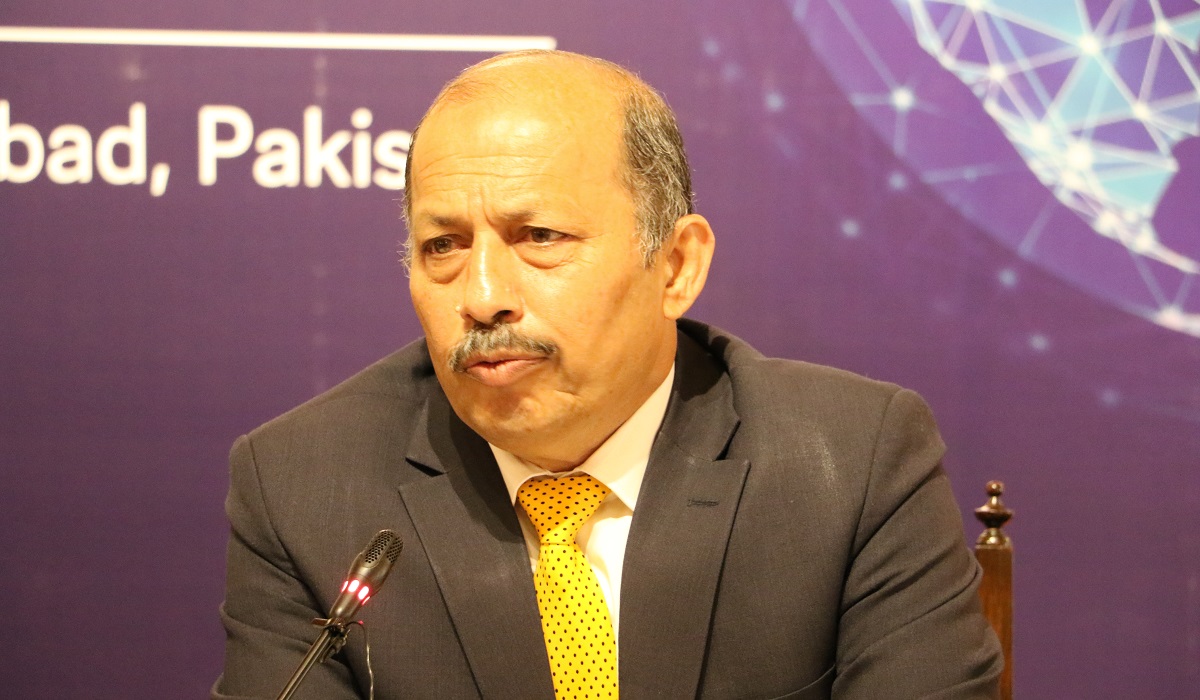
Dr. Huma Baqai, an international relations expert gave critical insight into the developments that occurred since August 15, 2021, the impediments in the way of recognition, the regressive policies adopted by the Taliban, such as the girls’ school ban and restricted mobility, and lack of livelihood opportunities for women, and the impact of parochialism on the future of the country and its social fabric.
Below are the key takeaways from the presentation:
- Afghanistan needs a formal government to rid itself of the ongoing and future crisis
- If the girls’ schools do not reopen, the Afghan women would lose all the progress and agency they have acquired over the last 20 years
- Afghanistan’s current cabinet is predominantly Pushtun, other ethnicities have little to no representation. The Taliban need to bring inclusivity through public consensus, considering the needs of each group
- The Taliban have not demonstrated satisfactory performance in any of the areas, except that they are somehow driving the economy and generating revenue through trade with the neighboring countries
- Taliban’s recognition remains contingent on implicit commitments made in the Doha Agreement, especially concerning the fundamental rights of minorities and women
- Taliban’s internal conflict is the major impediment to decisions on crucial issues such as girls’ education and women’s right to work and mobility
- Religious scholars are the thinking elite of Afghanistan and can play an integral role in advocating for girls’ right to education and women’s right to work. They should be included in the discourse on policy-making and legislation
- The Taliban need local and district-level reforms to address the ethnic rifts and governance loopholes
- Inclusivity of genders, ethnicities, and thoughts is direly needed in Afghanistan
THEMATIC DISCUSSIONS
STATUS OF GIRLS’ EDUCATION AND WOMEN’S RIGHTS
The second session focused on the status of girls’ education and women’s rights under the Taliban regime. Pakistani religious scholar, Dr. Maryam Noreen, gave an overview of the importance and essence of girls’ education in Islam and its instrumentality for a prosperous and self-sufficient Islamic state. Dr. Noreen said that the female literacy rate in Afghanistan during the last 20 years, but the current and delayed closure of girls’ schools is likely to bring down the ratio of literate females in the country which will harm the Afghan infrastructure and society. “Yes, the Taliban might be working on the matters such as choice of curriculum or educational framework, but that too should not cause such a prolonged delay. The Afghan girls have already lost 3 academic years, 2 due to the COVID-19 pandemic and 1 since the takeover by the Taliban. The pursuit of knowledge is obligatory for both men and women in Islam. The Taliban must be considerate of that.”, she concluded.
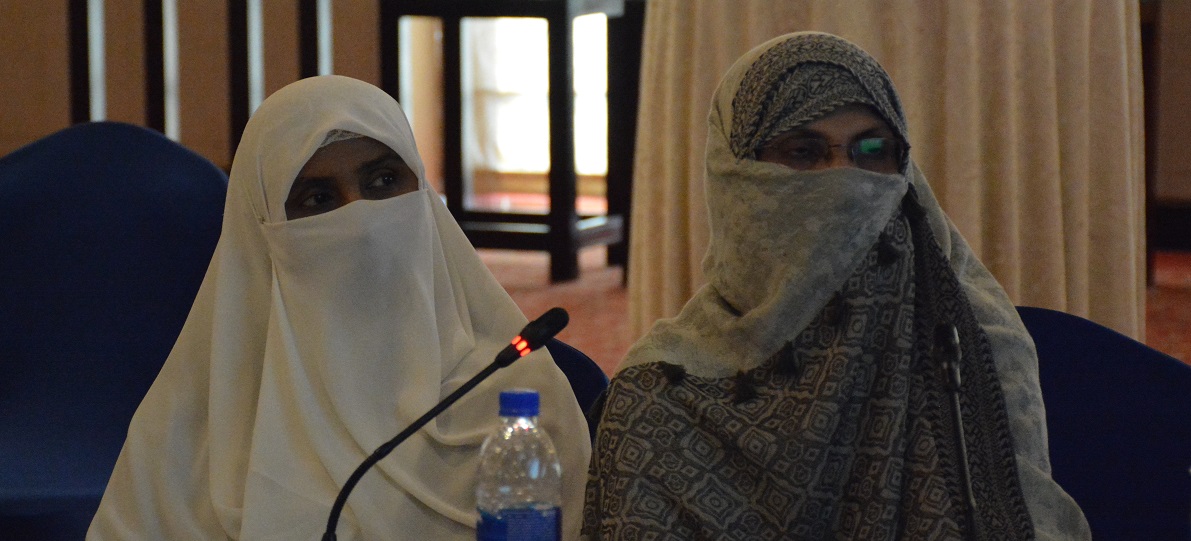
Ms. Farzana Obaidi, an Afghan participant, said that women are subject to more vulnerability and suffering in times of war. “As a woman and mother of a daughter, I speak on behalf of all Afghan girls and women, the Taliban can not deprive them of their right to education.”, she said. Ms. Obaidi further commented that the Taliban’s excuse for girls’ uniforms lacks rationale because girls and women in Afghanistan have always practiced hijab regardless of who rules the country. Mr. Shoukatullah Haqqani, a Pakistani participant, said that the Pakistani religious community wholly supports the cause of Afghan women’s right to education and work. Mr. Abdul Wahid Wahid, an Afghan scholar who strongly advocates for girls’ education through his writings, opined that Afghanistan does not need a western framework for girls’ education in Afghanistan, the Taliban can devise one on their own, all they need is a strong intent and realization of the magnitude of the problem.
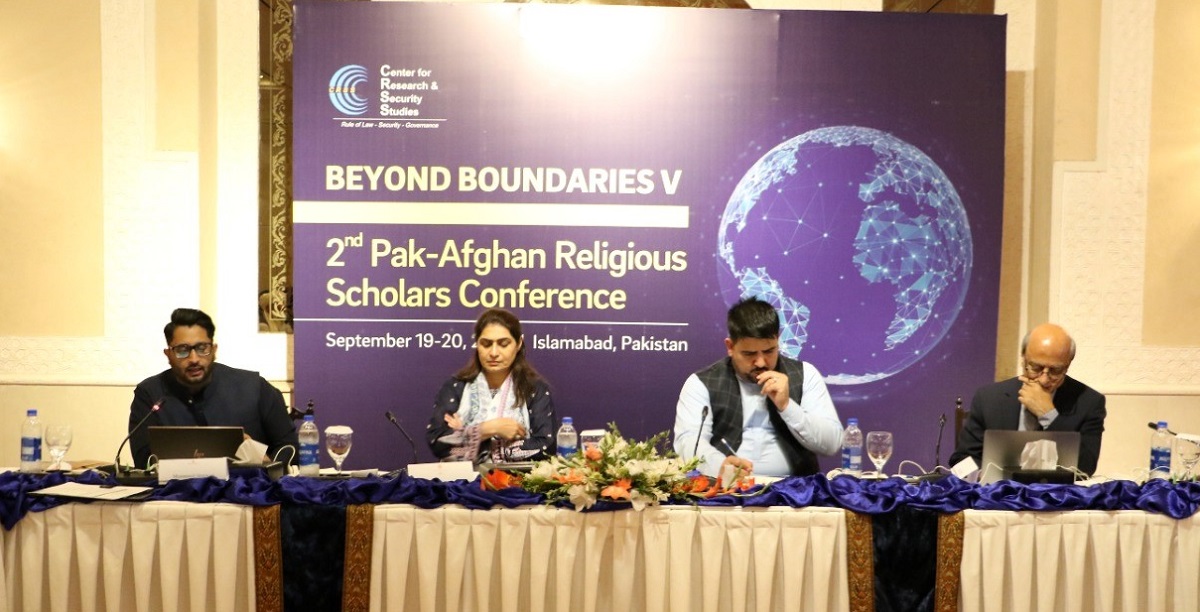
Dr. Huma Baqai stated that the Taliban are systematically eliminating female faces from the social and political spheres of the country. She further said that all the progress that Afghan women have made in the past two decades, whether significant or not, would go futile if the Taliban do not immediately reopen girls’ schools. “With multifaceted perils such as economic crisis, ethnic rifts, and societal polarization, the last nail in the coffin is the prolonged closure of girls’ schools. They (Taliban) seriously need to reconsider if their ideological clash is with the west or the entire Afghan society.”, the academician commented.
INCLUSION OF ETHNIC MINORITIES
The third session focused on the inclusion of ethnic minorities in governance. Mr. Mozammil Shinwari, Executive Director of the Organization for Economic Studies and Peace (OESP) said that the Taliban have been careful about sectarian sensitivities and there have been no reports of minorities’ oppression at the hands of the Taliban. “However, a free and fair election is a prerequisite to ensuring an all-encompassing system of governance and rift-free Afghan society.”, he added.
Chief Khateeb Molana Tayyab Qureshi said that the Taliban should have direct contact with the masses, so their concerns are addressed promptly. He further said that the Taliban must sit with the opposition groups to resolve crucial issues and talk. “Open and candid discourse is the key to peace among all parties, even if they hold contrasting views.”, he added.
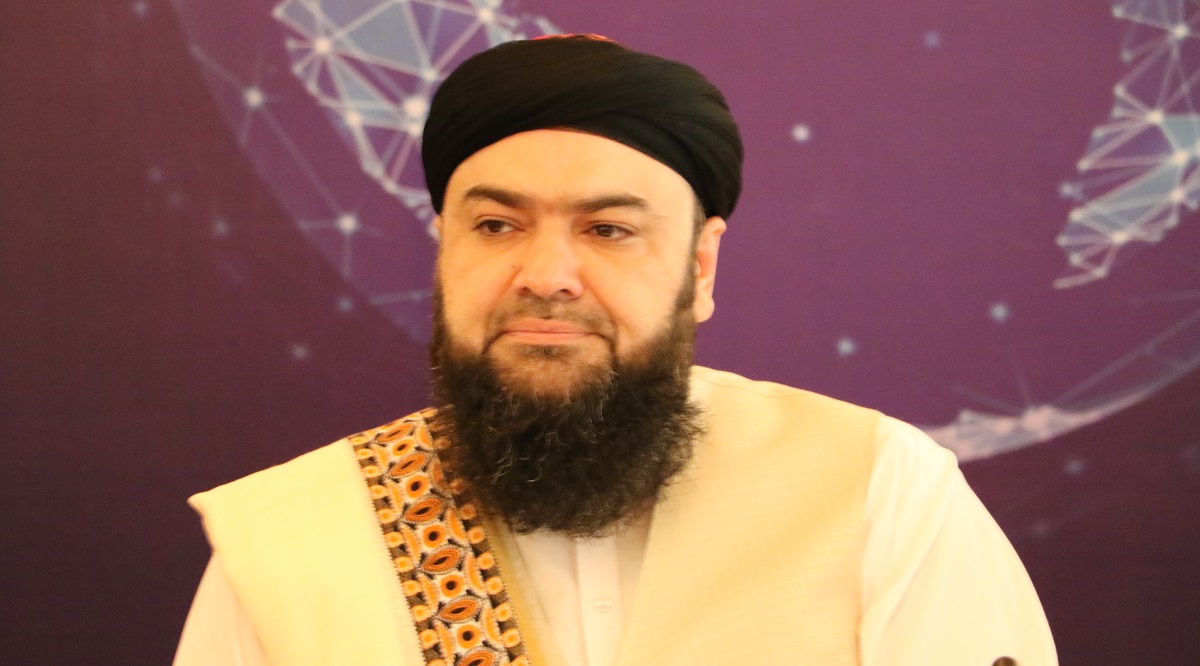
On the inclusion of Shias in the government, Mr. Allama Abid Shakiri said that in the current interim setup, no Shias are holding key portfolios in the government. He further said that the no doubt the Taliban have an ideological disagreement with the world, but it is the internal division (which exists between the Shias and non-Shias) they need to address first.
Mr. Abdul Wahid Wahid asserted that the Taliban have never claimed that they represent Pushtuns only. “There are many Pushtuns who are upset with the Taliban because they are making all ethnicities suffer. It is not about Hazaras, Tajiks, Uzbeks, Pashais, or Ismailis – the Taliban have upset the majority by not living up to their promises. Yes, there are very few blasts and terrorist attacks these days, but what about civil liberties, the agency in national decision-making, and opportunities for livelihood for all? Have they been able to deliver? I believe not.”, said Mr. Wahid.
PEACE AND SECURITY
During the final sessions of the conference, Pakistan participant, Tahmeed Jan Azhari gave an overview of Afghanistan’s peace and security situation, highlighting the repercussions following Al Zawahiri’s killing, the expediting presence and activity of ISKP (Islamic State of Khurasan Province), and the Afghan Taliban’s stance on TTP (Tehrik-e-Taliban Pakistan). Mr. Azhari said that Pak-Afghan peace and security are intertwined, hence, the presence of Al Qaeda, ISKP, TTP, and other groups, not only jeopardizes Afghanistan’s security but of the region too. He further said that there is a lot of ambiguity around Zawahiri’s killing and that the Taliban must put forth the facts to the world. On TTP, he commented that it is a terrorist group for Pakistan, but for the Afghan Taliban, it might be freedom fighters. “Hence, he concluded that it is not easy to contemplate the de facto government’s intent and strategy to deal with the extremist group.
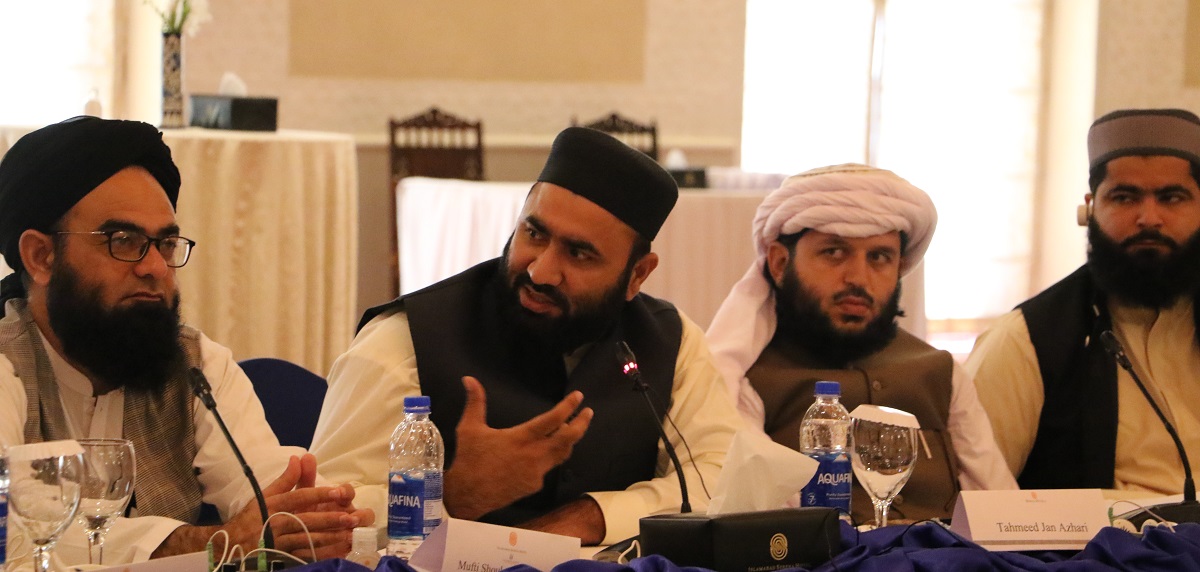
Molana Qasim Haqqani said that there have been reports of TTP receiving logistical and moral support from some Taliban figures. “As a cooperative neighbor, the Afghan Taliban must understand that it is the same TTP who targets Pakistani soldiers. They (the Taliban) should devise a concrete operational strategy to deal with the terrorist groups for sustainable regional peace and cordial bilateral ties.”, Mr. Haqqani opined.
Mr. Frotan said the Taliban have not provided sufficient security to the religious scholars, and if that persists, Afghanistan would lose thinkers, scholars, and most important: proponents of education.
Mufti Hussain Asfi, who was part of the delegation of Pakistani religious scholars that visited Kabul in June 2022, said that as a Pakistani religious scholar, he was appalled to see the state of things in Afghanistan. “When Taliban had assumed control of Afghanistan, they aimed to bring certain systemic changes- for better, but the current circumstances tell otherwise. In case the Taliban government fails, it would bring them and the region, especially Pakistan, immense shame.”, he said. He also stated that the Pakistani religious fraternity upholds the importance of education as it is the backbone of a prosperous society. “If the Taliban normalize education for girls, it will not only ameliorate the Afghan human capital and create an academically sound society, but also act as a tool to tackle the global propaganda against them and their ideologies.”, Mr. Asfi concluded.
CONCLUSION
Mr. Imtiaz Gul gave the closing remarks at the conference and said that the first step towards finding the solution to crucial problems is to sit and discuss the problems, put forth contrasting views, and then agree on a solution that favors all parties.

He said that Beyond Boundaries V track 1.5/II dialogues aim to bring people from both sides on a common platform, discuss critical issues, devise actionable strategies and recommendations, and disseminate those recommendations through our prolific participants and partners among the relevant governmental and non-governmental stakeholders. “Being able to come up with such concrete and substantial recommendations despite disagreement and difference of opinions is commendable.”, he concluded.
